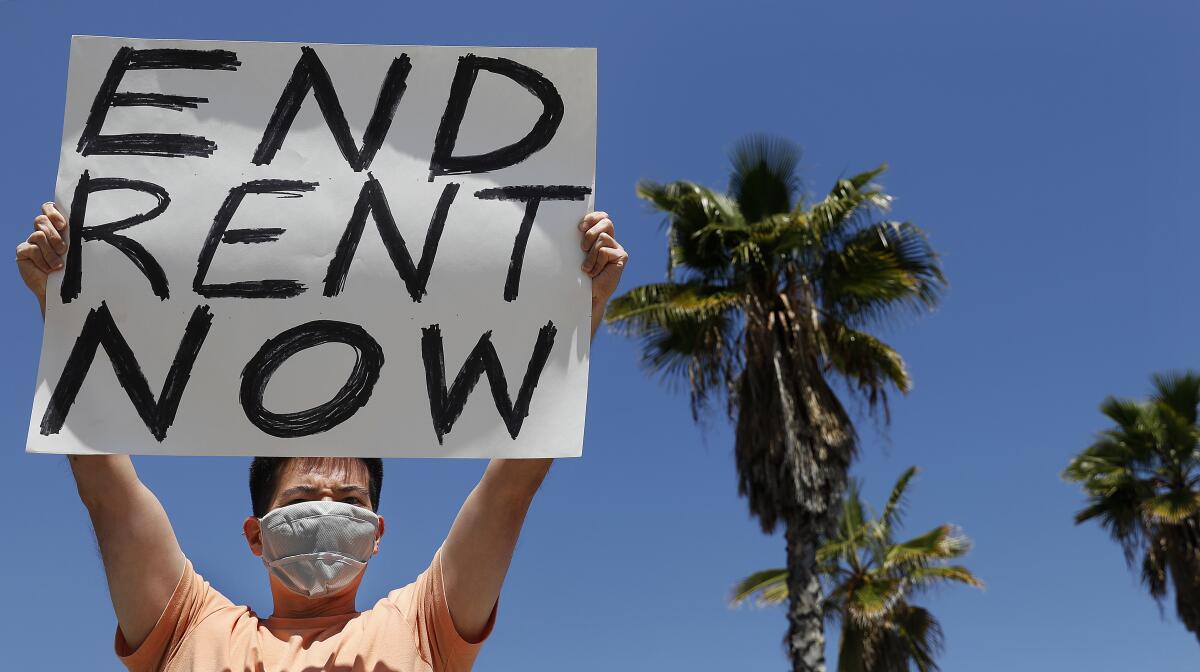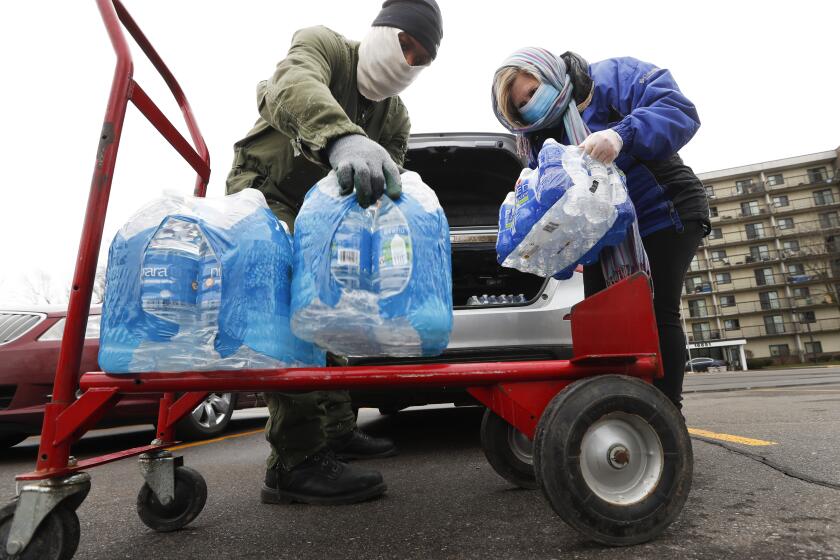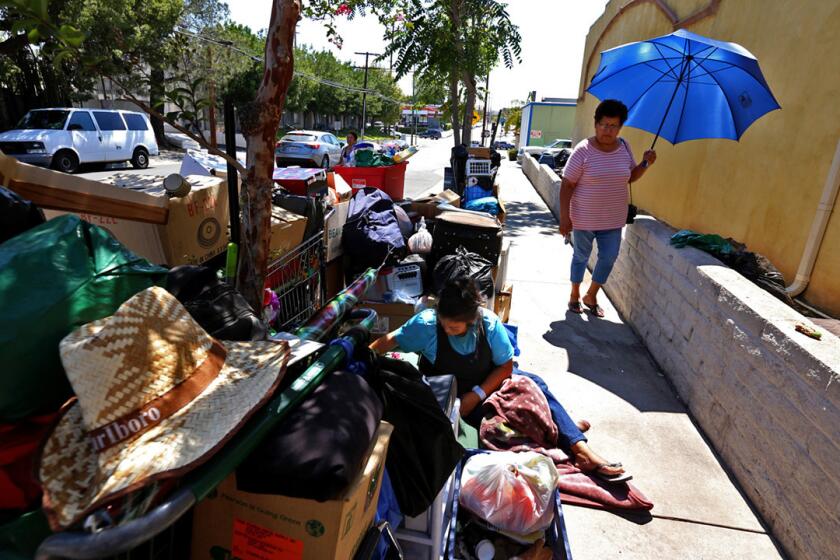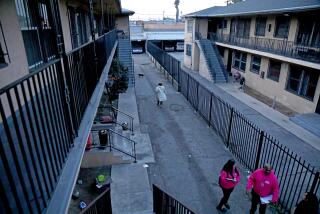Opinion: Coronavirus is going to create the mother of all housing crises if we don’t bail out renters soon

Nearly one in three renters in the U.S. failed to pay their April rent at the beginning of the month, a landlord industry group warned Wednesday.
That’s a big increase in missed payments, compared with even one month before. In March, 81% of households paid the rent within the first days of the month. By April, on-time payments dropped to 69% of households.
It’s not really surprising that so many tenants couldn’t make the rent this month, considering that 16.6 million people — roughly one in 10 workers — have filed for unemployment in the last three weeks.
But it’s still shocking to see how quickly so many renters sank into financial distress. It’s another reminder that too many people live paycheck to paycheck, and teeter on the edge of losing their home even in normal times.
California and other states have halted evictions during the coronavirus emergency. That will keep people housed during the pandemic. When the cash payments of $1,200 or more per family and the extra unemployment benefits in the federal rescue package begin to arrive, that will help some tenants cover their rent. Homeowners are getting a hand too; Congress and federal regulators have told mortgage lenders to let borrowers delay mortgage payments without penalty if they’re affected by the pandemic.
Still, there are many people who will lose income during the social-distancing-driven shutdowns and the recession they are causing. No state has yet figured out what to do when the emergency is over and how cash-strapped renters will manage when all that delayed rent comes due.
That’s a huge problem that could set off a chain reaction of distress.
Tenants who can’t pay their rent debt will face eviction, which can damage their credit and make it more difficult to rent another home. Many will likely have a hard time finding stable housing they can afford. California had a homelessness crisis before the pandemic. If evictions skyrocket after the emergency has passed, that will only add to the misery.
To avoid the kind of suffering and economic devastation that played out after the last recession, struggling renters will need a bailout. They will need some kind of rental assistance now to help avoid building up a debt that they can’t pay. Or they’ll need some kind of rent debt forgiveness down the road.
As COVID-19 spreads across the United States, only a few areas are breaking down the numbers of infections and deaths by racial and ethnic groups.
A growing number of housing advocates and local elected officials are calling on governors in California, New York, Washington and other states to use their emergency powers to cancel rent and put a moratorium on landlords’ mortgage payments during the coronavirus emergency. It looks like no governor has yet taken up the call to action, which is understandable because there are all kinds of complexities and ramifications that come from canceling rent.
One of the biggest questions is who should pay the cost of the rescue.
Landlords? No. That’s not fair. There are lots of landlords who are small business owners and rely on rent payments for their income or their retirement. We want landlords to stay in business. They provide an essential service: a roof over one’s head.
Besides, they’ve got problems of their own. Denied much-needed rent payments during the emergency, they risk foreclosure if their lenders don’t give them the option to delay mortgage payments. They face other penalties too if they can’t pay their property taxes or properly maintain their buildings. And they need to pay the employees who manage the day-to-day operations of properties.
Worse, the financial toll caused by lost rental income could prompt landlords to sell their properties in droves, which could trigger a real estate market crash. Or it could also hasten the ongoing shift from mom-and-pop landlords to investment firms. Advocates say that shift, which accelerated after the last recession, has already resulted in the loss of older, more affordable apartments as investors buy up properties to remodel and raise the rents.
Well, then, how about making mortgage lenders provide a cushion? Maybe. Fannie Mae and Freddie Mac are offering landlords forbearance if they do not evict tenants who can’t pay the rent during the coronavirus emergency. Landlords without government-backed loans don’t automatically get that relief, so a housing industry group is lobbying Congress to require forbearance for all multifamily mortgages. It’s somewhat easier for the banks that make mortgage loans to abide delayed payments. The lenders will eventually get most of their the money when the loans are paid off.
How about sticking Wall Street and big investors with the bill? That’s what some tenant groups have advocated. They want large corporate owners of rental housing and big banks that were bailed out after the last financial crisis to eat some or all of the cost of rent forgiveness. Yet some experts warn that could create problems, too. Lenders typically sell mortgages to the financial industry, which then bundles them into securities and resells them to investors. The buyers often are pension funds and insurance companies. When landlords default on the mortgages, that decreases the value of the bonds and, ultimately, the public employee pension funds that invested in them. So taxpayers have an interest in making sure Wall Street gets paid too.
Ultimately, the federal government is going to have to provide the policy direction and a lot more money to keep tenants housed, keep landlords whole and to stabilize the real estate market. The simplest solution would be for Congress to create an emergency coronavirus housing voucher to help struggling tenants cover the rent. Or perhaps Congress could direct mortgage companies to offer forbearance for, say, three to six months, with the federal government picking up the incremental costs associated with delayed payments.
There’s simply too much at stake for Congress and the Trump administration to be passive observers of any eviction tidal wave. They have a moral obligation to save the U.S. from another housing crisis.
Hotel rooms are what homeless people need now
More to Read
A cure for the common opinion
Get thought-provoking perspectives with our weekly newsletter.
You may occasionally receive promotional content from the Los Angeles Times.













